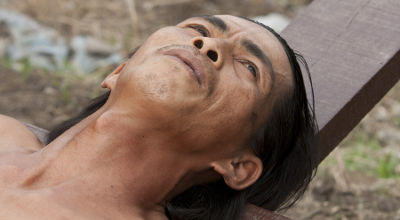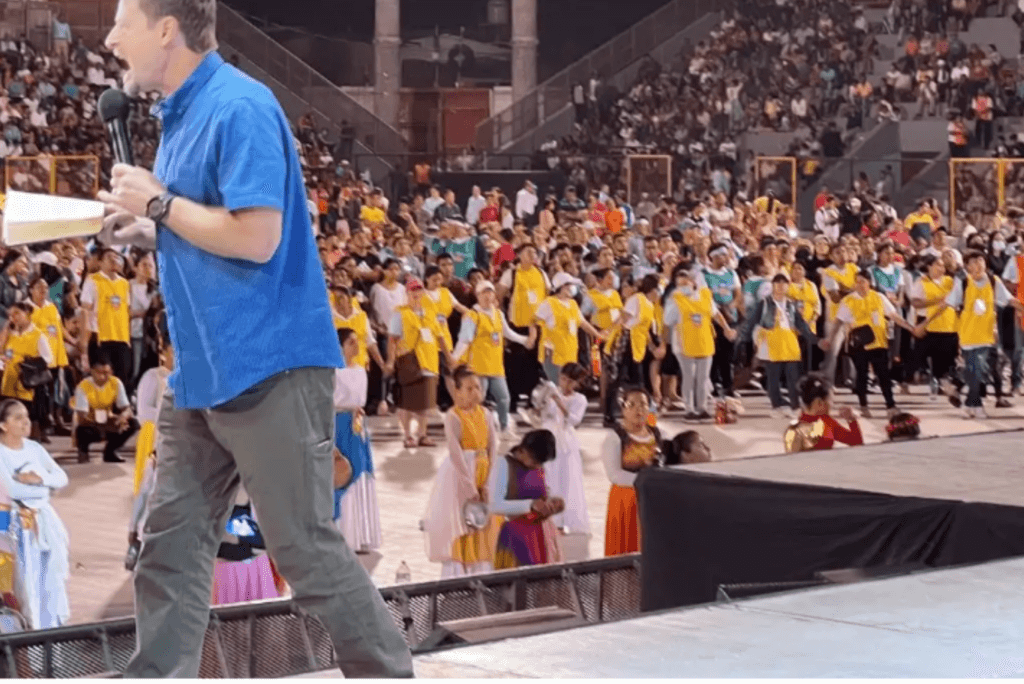Roberto Quiroz described himself as a “lost boy.” Quiroz’s parents abandoned him when he was a child. For years he sought to find them—with no success. At age 30, he made a desperate decision. He offered to be crucified.
Quiroz represents more than two dozen men who are crucified each year in annual Good Friday re-enactments in Pampanga, a highly urbanized province of the Philippines. According to reports, 24 men were crucified and nearly 3,000 flagellants paraded the streets in 2013, carrying wooden crosses or beating themselves with bamboo sticks. Officials expected 50,000 spectators—including local and international tourists—to witness the annual tradition. The Via Crucis or Stations of the Cross is now in its 51st year.
I met Quiroz—a thin man with shoulder-length hair—in 2008. The then 50-year-old was one of 25 men being crucified that year. I was struck by how reflective and gentle he seemed, wearing the pain of his past on a weathered face.
It wasn’t my first time to observe the crucifixions. My family and I had made the hour-plus trek from Manila with other families twice before. It was, however, my first time to talk personally with a penitent. As an evangelical Christian worker, I wanted to understand the motivations behind Quiroz’s extreme piety.
I also met a local official who introduced himself only as Rey. Dressed as a Roman soldier, he helped Quiroz and other penitents prepare for the crucifixion. Under the blazing Philippine sun—March and April are the country’s hottest months— Rey also controlled the crowd, communicating via walkie-talkie with others involved in the re-enactment and instructing tourists to remain in designated areas.
Of course, this did not apply to tourists like me, who for 50 pesos (about $1.50) could purchase a “press pass,” allowing better access to the penitents. As I handed Rey the 50 peso note, he gave me a small piece of paper on which was handwritten, “Press Pass.” At that point, I knew I’d been duped, but who was I to argue? I had to give Rey credit. He knew how to make a buck.
Rey and Quiroz represent the dichotomy of the Via Crucis tradition. Quiroz, who was highly inebriated in anticipation of the pain from the nails, was subdued and quiet. Rey was more animated, proud of the part he played in this local tradition.
“We do this for the remembering of our Lord,” Rey said.
Rey’s enthusiasm and Quiroz’s pensiveness were just one of the contradictions I witnessed that day. Other, more visceral contrasts also assaulted my senses—mournful readings of Scripture broadcast over loudspeakers; the rhythmic click, click, clicking of the flagellants’ whips; vendors under brightly colored umbrellas offering cold drinks and Filipino snacks. As the blood of flagellants puddled in the streets and splattered my sandals, children rushed to buy balloons and cotton candy.
While I took in the scenes and wondered how best to clean the blood from my feet, Quiroz and two other penitents waited in a vacant lot turned “Golgotha” outside the small village of Lourdes Northwest. The men smoked cigarettes and chatted with officials as they obsessively washed their hands with rubbing alcohol. Rey and other officials marked the penitents’ hands with ink at the spot where the 3-inch nails would pierce their palms. The nails had been soaked in alcohol overnight to limit infection, Rey explained.
On the outskirts of the crowd stood a small group from First Baptist Church, Dau—a community outside Angeles City. While thousands of spectators came simply to enjoy the festivities, First Baptist members came that morning to prayerwalk. As Quiroz milled about talking with visitors, Nenette Fundar, one of the church members, shared God’s love with him.
“This is so very sad,” Fundar said. “These people are very sincere, but they are sincerely wrong.”
I shared her sentiment. In spite of the festive atmosphere and the amazing hospitality of the Filipino people, I felt the heaviness and sadness that I often feel in the face of misplaced worship. It’s the same when I visit Hindu temples, Buddhist wats and Muslim mosques. I want them all to know that Jesus is the only way to God.
As the hours passed and morning turned to early afternoon, the crowd and anticipation grew — especially when a Roman soldier approached on horseback. Children began breaking through the outer fence surrounding the small mound on which the crosses lay. Quiroz and other penitents posed for photographs.
By mid-afternoon, the vacant lot was vacant no more as tourists swarmed the area. I was jostled about as the “press area” was overrun, and the advantages of my position became inconsequential. Still, it was more than an hour before the crucifixion actually took place. When it came, it came without warning and lasted only a minute.
Suddenly, Quiroz was lifted high above the crowd—his hands nailed to the cross. The other two men quickly followed. While one man grimaced in pain, Quiroz and the other man appeared at peace.
The three crosses were then quickly lowered to the ground. The crowd began to disperse. While three more men remained to be crucified, families drifted away and vendors packed up their goods. The show was over. I looked down at the blood still on my shoes. I was saddened—and slightly sickened—by it all.
The Catholic Church does not endorse these acts but permits them for reasons of faith. Regular participants in the Via Crucis are driven by a variety of motives—to earn forgiveness for sins of the past year, to identify with the sufferings of Christ or to gain favor from God.
Quiroz’s reasons were more personal. Following his first crucifixion at age 30, his prayers were answered. Quiroz found his family.
“This was a favor from God because I was willing to experience the sufferings of Christ in my own body,” Quiroz explained. He continued the practice another 20 years in gratitude that he is no longer “a lost boy.”
Somewhere in the religious history of the Philippines, many Filipino Catholics—who make up more than 81 percent of the country’s population—have replaced a personal relationship with God through Jesus with reliance on ritual and tradition. Some believe they can earn favor from God by subjecting themselves to pain and suffering. They forget that Christ has already died in their place.
Fundar and others like her pray these attitudes will change as they share the Gospel with their friends and neighbors.
“I pray that God will remove their blinders and that this tradition will be powerless,” Fundar said. “I pray that salvation through Jesus Christ alone will be theirs.”
Perhaps, through Fundar’s prayers and others like her, Quiroz will someday become a part of the family of God. Perhaps, someday, he will no longer be a “lost boy.”
For the past five years, this has been my prayer.
See an error in this article?
To contact us or to submit an article






















